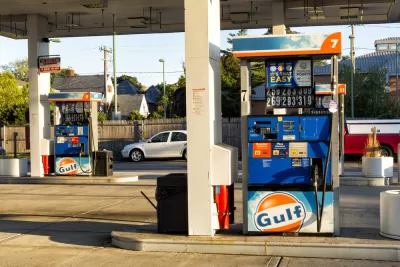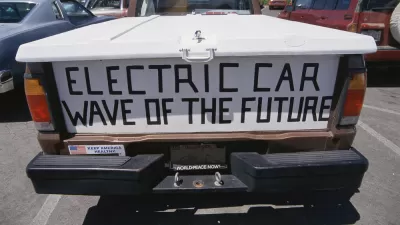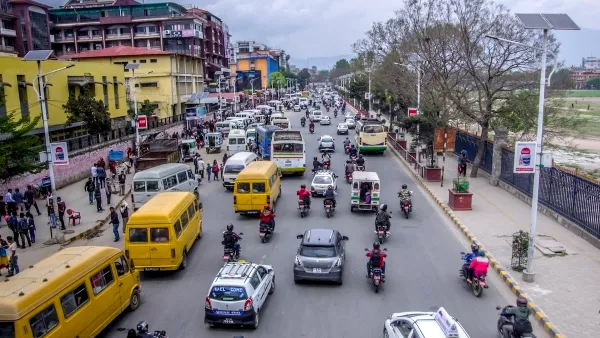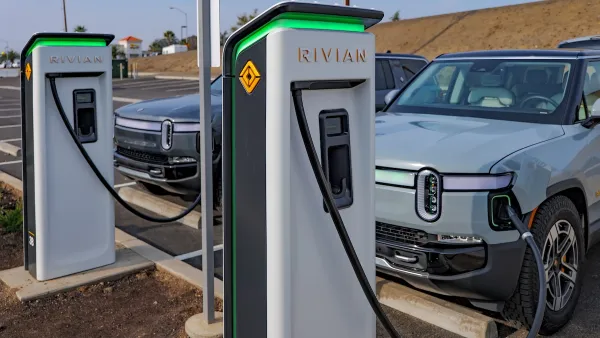The new "50 Steps Toward Carbon-Free Transportation" report examines the gulf between the reality of the U.S. transportation system and the innovations that will be necessary to achieve a carbon-free future.

Tony Dutzik shares new of a new study from the Frontier Group that recommends 50 steps toward carbon-free transportation. The report focuses on the United States, acknowledging that the U.S. transportation system is "Climate Enemy #1."
Dutzik's distillation of the new report includes a lot of quotable facts and illustrative infographics, sure to be of use to those working against the car-centric status quo. For instance, Dutzik includes the following regarding the reality of the U.S. transportation system:
- "Climate change is rarely a factor in transportation decision-making. Only seven states have enforceable, economy-wide limits on carbon pollution, and, as of 2012, the vast majority of states and metropolitan planning organizations did not even consider greenhouse gas emissions in agency planning processes."
- "America spends vastly more on infrastructure for high-carbon modes of travel than low-carbon modes. Between 1956 and 2014, 79 percent of all government capital expenditures on transportation went toward highways, according to Congressional Budget Office data."
- "The federal funding match for new highway projects is generally higher, and the burden of evaluation lower, than major transit capital projects."
Luckily, the report also works from the belief that the United States has the tools to build a carbon-free transportation system, both in policy and in technology. Dutzik lists those tools and explains how each of them can contribute to the cause.
FULL STORY: 50 Steps Toward Carbon-Free Transportation: Rethinking U.S. Transportation Policy to Fight Global Warming

Planetizen Federal Action Tracker
A weekly monitor of how Trump’s orders and actions are impacting planners and planning in America.

Maui's Vacation Rental Debate Turns Ugly
Verbal attacks, misinformation campaigns and fistfights plague a high-stakes debate to convert thousands of vacation rentals into long-term housing.

Restaurant Patios Were a Pandemic Win — Why Were They so Hard to Keep?
Social distancing requirements and changes in travel patterns prompted cities to pilot new uses for street and sidewalk space. Then it got complicated.

In California Battle of Housing vs. Environment, Housing Just Won
A new state law significantly limits the power of CEQA, an environmental review law that served as a powerful tool for blocking new development.

Boulder Eliminates Parking Minimums Citywide
Officials estimate the cost of building a single underground parking space at up to $100,000.

Orange County, Florida Adopts Largest US “Sprawl Repair” Code
The ‘Orange Code’ seeks to rectify decades of sprawl-inducing, car-oriented development.
Urban Design for Planners 1: Software Tools
This six-course series explores essential urban design concepts using open source software and equips planners with the tools they need to participate fully in the urban design process.
Planning for Universal Design
Learn the tools for implementing Universal Design in planning regulations.
Heyer Gruel & Associates PA
JM Goldson LLC
Custer County Colorado
City of Camden Redevelopment Agency
City of Astoria
Transportation Research & Education Center (TREC) at Portland State University
Jefferson Parish Government
Camden Redevelopment Agency
City of Claremont





























